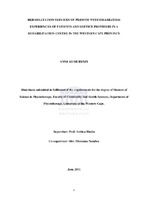Rehabilitation services of persons with disabilities : experiences of patients and service providers in a rehabilitation centre in the Western Cape Province
Abstract
Rehabilitation is important for persons living with disabilities as it contributes to their sense of autonomy, self-worth, social participation and improving their quality of life. Improving the quality of rehabilitation services requires the incorporation of patients' perceptions with those of service providers regarding these services. Different studies have revealed that persons with disabilities have experienced inaccessibility of rehabilitation services with regards to inaccessibility and unavailability of transport, inadequate provision of information related to their disability. Lack of staff and skills training are the main experienced challenges encountered by the service providers in the rehabilitation service provision. Hence, the current study aims at exploring the persons with physical disabilities and service providers' experiences regarding the rehabilitation services provided at Bishop Lavis Rehabilitation Centre. A qualitative study design was used for data collection. Eleven participants among patients were conveniently selected for the focus group discussion and three key informants among the service providers participated in the in-depth interviews. The focus group discussion and the interviews were tape-recorded and transcribed verbatim and the data was thematically analysed using pre-determined themes. Permission to conduct the study was sought and granted from the Senate Research Grant and Study Leave Committee at the University of the Western Cape, the Western Cape department of Health as well as the facility manager of Bishop Lavis Rehabilitation Centre. Written informed consent was obtained from the participants prior to the focus group discussion and interviews. The results indicated that patients experienced problems of accessing transport to and from the rehabilitation facility. The taxis and buses were either inaccessible or unavailable for persons with physical disabilities. Poor referral systems, shortage of staff, lack of skills training were among the main challenges that arose in the interviews with the service providers. Due to the workload that service providers encountered, they sometimes lacked time to interact and communicate with patients. Participants in both groups reported positive responses regarding patient participation and involvement in the rehabilitation sessions and
interaction between patients and service providers. Though some patients expressed the
review that the dissemination of information related to group sessions was inadequate, most of the participants in both the focus group discussion and the in-depth interviews stated that, patients were adequately informed on their conditions and treatment. The study concludes by highlighting the need to improve rehabilitation services in terms of increasing the capacity of service providers, equipment, training of service providers and providing transport services for persons with disabilities. There is a need for those planning the rehabilitation services and policy makers to recognise the challenges encountered by those receiving rehabilitation services as well as those providing these services as discussed in this study. Hence, this will help in developing appropriate, accessible and cost effective rehabilitation services that meet the needs of persons with disabilities.

